Blogs » Society » Dewey Defeats Truman, Says CNN
Blogs » Society » Dewey Defeats Truman, Says CNN |
- Dewey Defeats Truman, Says CNN
- China’s So-Called ‘Commercial’ Banks Are Anything But
- Chinas Cooking The Books Again–Or Are They? (Probably, But Not So Much)
- Holding up half the sky, but taking all the rap
- It Really Is This Easy To Block All Lanes of Traffic During Rush Hour
- Chinese New York Times Weibo account suspended and then reinstated
- Female driver strips naked to stop ambulance after hitting a girl, causes death of victim
- Business tries to do what Rio did not
- Chinese Company’s CEO Allegedly Makes Off With Millions
- Our Hong Kong Subsidiary
- Meme Thursday: How Old Do You Suspect These Guys Are?
- Danwei Model Workers 2012 – New additions to the final list
- Corrupt Guangdong official gets 15 years in jail
- Top Ten Search List (June 28)
- Watch: Policeman crushed under a car, escapes with fractured leg
- Develop your students. Develop your career. Teach with EF English First. [Ad]
- London’s Official Olympics Song Is Terrific And Terrible And Really Something
| Dewey Defeats Truman, Says CNN Posted: 28 Jun 2012 08:47 PM PDT Politics in the US is messy and often stupid. But what's CNN's excuse? The mandate for universal health care, of course, was upheld by the Supreme Court, 5-4. But hey, we all make mistakes. No worries, CNN — here's a link to your story on the matter. And if you want a China spin, here are reactions from netizens on Weibo, compiled by Tea Leaf Nation. An example of an informed response: "@豆麻麻-Kathy [from Shanghai]:China also needs this kind of leader, someone truly dedicated to helping common people. But it's easy to pass a law [Eds. - not in this Congress!], the real implementation and administration is the hard part." Love it when people are sensible on the Internet. (Image via Imgur, h/t Derrick Sobodash) UPDATE, 11:54 am: Saw this on Gawker right after I posted: CNN, of course, has issued an apology. Fox News, which made the same mistake as CNN, apologies for nothing, according to the Hollywood Reporter, which notes via a Gawker link:
And in that above link, Gawker adds, with a nod to Romenesko (this is how you hyperlink — you paying attention, China blog editors?):
|
| China’s So-Called ‘Commercial’ Banks Are Anything But Posted: 28 Jun 2012 08:41 PM PDT Guest post written by Junheng Li Junheng Li is the founder of JL Warren Capital, an equity research consulting firm based in New York. She is a Shanghai native. Riding the high-speed rail from Shanghai to Nanjing, I couldn't help overhearing a conversation between two 40-something loan officers from the Nanjing office of the Industrial and Commercial Bank of China (ICBC), the country's largest state-owned "commercial" bank by total assets. "Our government is running out of money, but we're still underwriting social housing projects. It's a political mandate. The private sector? No chance…No government backing and no collateral…I get fired if they go belly up." That conversation underscores one of the biggest distortions in the Chinese economy: The country's so-called "commercial" banks are by no means commercial at all–they lend at the behest of the state and local governments, and doing so effectively gives them control over the economy's capital allocation and pricing. It also goes a long way toward explaining the effectiveness and timeliness of China's economic stimulus in 2009 to ward off the global financial crisis, especially in comparison to the U.S. Fed's lackluster "quantitative easing" policies. In 2009, once China's central government approved the 4 trillion yuan stimulus package, banks immediately poured money into local governments to build roads, airports and rails. Infrastructure projects sprouted from busy coastal cities to less populated central areas, while capital intensive industries, like automakers and steel mills, expanded production capacity beyond their respective industry's expected demand for years to come. Although most of these crisis investments have not and will likely never generate adequate financial returns, the government frequently extols their positive social impact of boosting employment levels, no matter if those jobs are the equivalent of digging holes so they can be filled back in again later. Local Governments Go Belly Up When China's growth had accelerated in the past, land sales could be relied upon to enrich local governments' tax coffers, enabling them to pay off debt. However, decelerating growth and a softening real estate market has turned into a drain on local governments' revenue, while at the same time they face increasing pressure to boost investment to ward off the slowdown. As municipalities increase borrowing and spending, debt catches up with and soon exceeds their ability to service, let alone repay their debt. ICBC, where the two aforementioned loan officers work, typifies the state-owned "commercial" banks that have had to restrict access to credit as a result of rising deficits among local governments. However, the tightening measure is biased in that they primarily target the private sector. Wenzhou, a coastal city in Zhejiang province that was the birthplace and now serves as a hub for the country's private economy, has been suffering the most. The city has about 400,000 small- and medium-sized enterprises, or SMEs, with signature products ranging from synthetic leather, shoes and apparel, to eyeglasses and cigarette lighters. At the peak of the credit crunch last year, underground funds to SMEs in Zheijang were charging annual interest rates as high as 70%, compared with 7% of the bank lending rate. Patricia Cheng, a China analyst from CLSA Research in Hong Kong wrote during her recent visit to the city: "Prices at a luxurious residence on the riverside have dropped to 50,000 yuan ($7,860) per square meter from more than 70,000 ($11,000) a year ago. Low end, high end, all forms of consumption seems to have hit a wall. It isn't what I expected at all." |
| Chinas Cooking The Books Again–Or Are They? (Probably, But Not So Much) Posted: 28 Jun 2012 04:19 PM PDT A few days ago, I highlighted Keith Bradsher's 'Chinese Data Mask Depth of Slowdown, Executives Say' here on CHINA Debate, 'China's Cooking The Books Again, All Is Well With The Economy (In The Last Act). Now, the Financial Times has come out with a rebuttal of sorts, 'Chinese econ stats: to doubt or not to doubt?' In it, Simon Rabinovitch cites some of Mr. Bradsher's article: Indeed, officials in some cities and provinces are also overstating economic output, corporate revenue, corporate profits and tax receipts, the corporate executives and economists said. The officials do so by urging businesses to keep separate sets of books, showing improving business results and tax payments that do not exist. The executives and economists roughly estimated that the effect of the inaccurate statistics was to falsely inflate a variety of economic indicators by 1 or 2 percentage points. That may be enough to make very bad economic news look merely bad. He then provides the counter argument from Lu Ting of Bank of America-Merrill Lynch: Lu Ting of Bank of America-Merrill Lynch countered that it just doesn't make sense that local officials would want to overstate electricity production. Energy use per unit of GDP is an important metric for gauging the environmental record of officials, so exaggerating electricity production would be self-defeating. What's more, local governments would only be too willing to report real numbers: "as many local officials have been pleading Beijing to ease tightening measures, it's not in their interest to massively over-report power data to mask the slowdown". And, Zhu Haibin of JP Morgan: Zhu Haibin of JP Morgan questioned whether it would even be possible for power companies to distort data to any significant extent: "the power production number is difficult to falsify given the high concentration in the market and big companies report the data directly to the central government via automated computing system." Both echo the argument put forth in Mr. Bradsher's article: Jonathan Sinton, a China energy specialist at the International Energy Agency, said he had not heard of false data in China's electricity sector, and he doubted it would be feasible at the five biggest electricity generation companies that together produce half of China's electricity. "If there is a problem, it is going to be located in the smaller producers," he said, cautioning that even these producers would eventually have to submit accurate information to reconcile fuel, electricity and financial accounts. There is probably some truth in both sides. Goodness knows that Chinese officials cook books. I tend to come down on the side that the overstatement of electricity use, if much, is very local and doesn't include the big generators. Big conspiracies are hard to hide in the best of circumstances. And, in the cutthroat world of Chinese factional politics and the never ending efforts at oneupmanship and pushtheotherguydownmanship, probably impossible. Either way, as I wrote in the earlier, it doesn't matter: I would add to that also that it will recover when the actions that the Central Government dares not call 'stimulus' kicks in. The new stimulus may be better run, better targeted, better fitting the reform agenda, but it will be as big as it needs to be to get the job done. Hu Jintao is not planning to have the legacy: 'He's the guy who drove the Chinese economy into a ditch.' |
| Holding up half the sky, but taking all the rap Posted: 28 Jun 2012 12:56 PM PDT  This is Danwei Week, a summary of the most important China stories from the last seven days. We'll choose a maximum of five topics per week, and try to link to the best coverage of them in English. If this new weekly feature works, it will become a standard part of the Sinica podcast. Depressing news about women in China Feng Jianmei remains in the news: Feng, a resident of rural Shaanxi, was forced to abort her seven-month old fetus after failed to pay a 40,000 yuan fine. Although yesterday the BBC reported that the head of the family planning bureau in Zhenping county had been sacked, it seems Feng Jianmei's family's ordeal is not yet over. After her husband was interviewed by German reporters, a protest was staged outside his home, the centerpiece being large red banners with the motto 'Strike down the traitors; Kick them out of Zengjia township.' The Ministry of Tofu has photos of the banners and translations: Forced abortion victim branded 'traitor' for talking to foreign media. In Shanghai, Subway Line Two official Weibo account posted a picture of a female passenger in a semi-transparent outfit, along with comments that included the following: "If that's what you wear on a subway, then no wonder you will be sexually harassed!" Tea Leaf Nation has rounded up Internet reactions, along with the photo originally posted by the Shanghai subway staff. In an opinion piece on Foreign Policy, Paul French looks at the media obsession with Bo Xilai's wife Gu Kailai, accused of and widely believed to be guilty of murder despite the lack of a trial or any evidence in the public domain. Is she just the latest 'dragon lady' who is blamed for the failings of the men around her? Finally, The Economist's Analects blog has a piece titled Girl power up, which looks at the some of issues above and more about the place of young women in Chinese society. Shaxi: Another Riot in Guangdong SARFT announces crackdown on media bribery Caixin has a short report on the crackdown. South China Morning Post self-censorship blues |
| It Really Is This Easy To Block All Lanes of Traffic During Rush Hour Posted: 28 Jun 2012 12:21 PM PDT A road Well last week, bicycling through Guijie in the late evening, I noticed standstill traffic. Traffic is usually somewhere between bad and terrible, but standstill was unusual, considering there aren't that many stoplights. I navigated my bike around the mess, then realized the problem: because a bus had scraped against the side of a taxi, the taxi driver refused to move his car, fearing that would alter precious evidence that could be used against the bus driver. As a result, no one could get through, and this is what I saw in front of me:
Absolutely nothing. Again, thanks to the one cabbie who wouldn't pull forward. I had nothing but the open road — Guijie during evening rush hour. The thought made me giddy. I don't know what happened with the taxi and bike driver. I think the cabbie did agree to move aside, eventually, because one by one, slowly, cars passed me on the road. But imagine if you were stuck behind that debacle. Imagine your anger. How would you possibly cope? |
| Chinese New York Times Weibo account suspended and then reinstated Posted: 28 Jun 2012 06:41 AM PDT  The New York Times has just launched a Chinese language web site, targeting China's "educated, affluent, global citizens." On Thursday, cn.nytimes.com went up in an effort to expand its reach into international markets and to gain revenue from luxury ads targeting China's growing upper echelon. The site will be a combination of translations from the New York Times main website as well as articles written by Chinese editors and local freelance journalists. [ more › ] The New York Times has just launched a Chinese language web site, targeting China's "educated, affluent, global citizens." On Thursday, cn.nytimes.com went up in an effort to expand its reach into international markets and to gain revenue from luxury ads targeting China's growing upper echelon. The site will be a combination of translations from the New York Times main website as well as articles written by Chinese editors and local freelance journalists. [ more › ]     |
| Female driver strips naked to stop ambulance after hitting a girl, causes death of victim Posted: 27 Jun 2012 10:15 PM PDT June 27th, 2012 by Key | Posted in News | 1 Comment »
From Sohu and various sites: A latest video about a traffic accident aroused the sympathy of millions of netizens. After the female driver hit a girl and her mom, she did not try to save the injured; instead, she ran naked onto the ambulance to "grab" the heavily injured girl and lay at the wheel of the ambulance to stop it from leaving. The girl was dead while her mom is still in a coma. Many netizens criticized that the driver was lack of conscience, and even compared her cruelty with that of Yaojiaxin. Witnesses claimed that the psychiatry teacher "went mad" and she even yelled "bitch, I want to kill you."
According to Guangzhou Daily, this traffic accident took place in front of a government kindergarten in Lanshan District, Linyi City, Shandong Province. The mom of the girl lay flat on her back beside a white car. Her legs twisted, with a part of an electronic bike under her right leg. People nearby hurried to raise the car together and a man in camouflage coat carried the girl from out from under the car. The girl's face was full of blood, and she was already dying. Due to the harsh crash, the car windows cracked while the car body bended. Suddenly something shocking happened – the female driver took off her own clothes and lay naked at the front wheel of the ambulance. With the assistance of a hospital staff, a man in grey T-Shirt took the heavily injured girl onto the ambulance. To people's surprise, the female driver got up, rushed onto the ambulance and tried to pull the girl out. The nurses and other people on the spot hurried to take the girl back. After she failed to grab the girl, the female driver lay down again to stop the ambulance from leaving. The ambulance had to drive backward in order to leave. Yesterday, this incident spread widely online. Netizens condemned the female driver for "deliberately delaying the rescue of the injured and lacking conscience". It is reported that the female driver was once a psychiatry teacher and many netizens suspected that she pretended to be insane, attempting to shirk responsibility for her crime.
|
| Business tries to do what Rio did not Posted: 27 Jun 2012 11:07 PM PDT That corporations emerged from last week's summit looking more far-sighted than governments signals the depth of frustration with the paralysed UN system, says Isabel Hilton. A chorus of disappointment greeted the close of the Rio+20 conference last week. The Brazilian hosts, perhaps concerned to avoid a repetition of the dramas that attended the final hours of the COP15 climate meeting in Copenhagen, had lowered their ambitions for the summit to the point that they seemed unprepared to fight for anything that any country objected to. The result was a document heavy on words and almost devoid of any prospect of action. In its supply chain, the company has achieved a 50% reduction in the water used to grow its cotton and an 80% drop in pesticide use. It has also raised more than £100 million (US$156 million) for charity. Homepage image by youthpolicy.org |
| Chinese Company’s CEO Allegedly Makes Off With Millions Posted: 28 Jun 2012 04:30 AM PDT Another day, and another scandal-plagued Chinese company gets delisted from the Nasdaq. This time, ChinaCast Education Corp. has the ignominious fate of watching its shares tumble 87% to $0.54 in over the counter trading while hunting for millions of dollars gone missing. The Chinese provider of post-secondary education and e-learning services has been suffering from an internal struggle since early last year, when its former Chairman and CEO Ron Chan Tze Ngon was sacked by the board and accused of pilfering the company's coffers of more than half-billion yuan ($78.6 million). Chan, a Hong Kong citizen who co-founded ChinaCast in 1999, had been leading the firm since its establishment. But last March, he was removed from his position after repeatedly hindering an audit to the company's two subsidiaries in Shanghai. So far, the company estimates that roughly 700 million yuan ($110 million) has gone missing, in which more than 70% is thought to have been embezzled by Chan, according to the company's legal adviser in Shanghai. Chan also allegedly spirited away company chops, business licenses and destroyed operational records, making it far more difficult for his former colleagues to check the accounts and track down the vanished money. A statement released by ChinaCast said, "Chan's behavior not only harmed the interests of the company's shareholders and employees but also posed a threat to those honest Chinese firms who aim to enter foreign capital markets." However, Chan denied the accusation during an interview with China Business News, adding that the reason behind his ouster was because the board had tried to seize control of the company. ChinaCast and several of its subsidiaries filed an application with the High Court in Hong Kong last week, alleging Chan along with the company's former Chief Financial Officer Antonio Sena, former Chief Accounting Officer Jim Ma and former President-China Jiang Xiangyuan had committed tortious wrongs against the company in transferring the company's cash and assets. As part of the application, the company also sought an injunction to freeze the assets of these executives that are located in Hong Kong, up to a value of 800 million yuan. In addition, the court has scheduled a hearing for July 6. |
| Posted: 26 Jun 2012 06:00 PM PDT
This posting includes an audio/video/photo media file: Download Now |
| Meme Thursday: How Old Do You Suspect These Guys Are? Posted: 28 Jun 2012 03:38 AM PDT Yeah, we know this usually runs on Wednesdays. You'll live. Sources: MyLaowai, We Know Memes, China Memes |
| Danwei Model Workers 2012 – New additions to the final list Posted: 28 Jun 2012 03:43 AM PDT Since publishing Model Workers 2012 we have received a number of comments and emails suggesting that other blogs be included. We also realized that there a few sites that we omitted in error. As promised, we're going to add to the Model Workers list 2012: the final edition will be published next week. Below are some of those suggested and some of our own. Please let us know in the comments or by email to feedback -at- danwei dot com which ones you think should be included, and feel free to add additional suggestions. We do not usually open comments at Danwei, and the comments section here will be not publish any abusive comments, or anything of which we don't like the tone. ★★★★★ Free More News China Accounting Blog Hao Hao Report, Lost Laowai and China Blog Network Beijing Boyce Maosuit Jing Daily China in Africa podcast Adam Minter on Bloomberg ★★★★★ Anything missing? Do let us know. |
| Corrupt Guangdong official gets 15 years in jail Posted: 28 Jun 2012 03:43 AM PDT by Allison Carroll Goldman on June 28, 2012  The front page of the Guangzhou Daily today announces that Ni Junxiong, the former Bureau Chief of Public Security in Maoming city, Guangdong province, has been convicted of corruption and sentenced to 15 years in jail. He will also be fined 3 million RMB and have another 3.38 million RMB worth of illegal income confiscated. Ni was found guilty of accepting bribes, and "selling" positions in public security offices at the county level, from Chief of District Public Security Bureau, to deputy chief. These appointments varied in price from 300,000 RMB to 20,000 RMB. He would also demand bribes from officials looking to take time off, whether to visit a relative in the hospital or to celebrate a holiday like Spring Festival or Mid-Autumn festival. Bribes were required in exchange for any promotions, letters of recommendation, or appointments, as well as any private-sector ventures that needed government approval. Ni has served in various positions of local-level politics in the past ten years: He sat on the Maoming City Communist Party Municipal Committee from December 2002, to July 2009; served part time as the secretary to the city's Politics and Law Committee starting in 2005; and in 2009 became Deputy Director of comprehensive management of the Public Security Office of Guangdong province. The Guangzhou Daily article reports that the trial found evidence of Ni's corruption dating back to 2002. The headline at the top of the front page: "Guangzhou held celebration activities in recognition of the 91st anniversary of the founding of the Communist Party of China." Links and Sources |
| Posted: 28 Jun 2012 02:52 AM PDT Here's the top ten real-time search list for today, recorded at 12:30PM. 1. 双面女婴 shuāngmiàn nǚyīng – "Two-Faced Baby Girl," the most-searched item of the mid-afternoon, makes today a questionable day for journalistic integrity. Starting last evening, more and more articles from a wide range of Chinese news sites have been treating the same outdated story (four years outdated, to be exact) as breaking news. Lali Singh, an Indian baby girl who was born in March of 2008 with Diprosopus—a rare congenital disorder by which the face is duplicated on the head—was considered by many in India to be the reincarnation of the Hindu deity Ganesha. She died two months after her birth, of a heart attack. Again, that was 2008. But over the past 24 hours, report after report has been published in the Chinese news media asserting that Lali was born in March of this year, 2012, and that she recently passed away. So everyone is clicking away (great for website traffic…coincidence?) at four year-old images of Lali, as if they are testaments to a new discovery. And no, it isn't as if the Chinese media missed this the first time around; similar reports came out in the actual year of Lali's birth and death. What's more, some articles from yesterday do cite the correct 2008 date of her birth, which only leads to another question: if you know it happened four years ago, why choose to bring it up again now, with nothing new to add? Something is up, but so far no apparent in-depth discussion on the part of netizens about the glaring bizarreness. Here's the story (again, from another source!) in Chinese. 2. 流动卖淫车 liúdòng màiyín chē – "Traveling Prostitution Salesman": At 10 PM this past Monday during an investigation of an illegal sex "shop" in Hangzhou, police discovered that though negotiations with clients went down on the premises, prostitutes conducted their actual business in a vehicle disguised as a "fire safety equipment inspection" van. Here's the story in Chinese. 3. nexus q – The Nexus Q, the new media-streaming entertainment device in the the Google Nexus product family, is making its way into everybody's search boxes today after its presentation at the Google I/O Conference. Points of discussion in Chinese articles range from the fact that Google wants this product line to spark the revival of "Made in America" products (the bottom of the device is inscribed with the words "Designed and Manufactured in the U.S.A") to the question of why the spherical media player, priced at 299 USD, is as pricey as it is. Here's the story in Chinese. 4. 西班牙vs葡萄牙点球 Xībānyá vs Pútáoyá diǎnqiú – "Spain vs. Portugal Penalty Kick": Much discussion of Cristiano Ronaldo—dubbed "C-luó" (short for "C-luónàěrduō" (C·罗纳尔多)) by fans—and Xabi Alonso right now, after Spain's penalty kick win over Portugal after a total of 120 scoreless minutes. Here's the story in Chinese. 5. 林郑月娥 Lín Zhèngyuè'é – Hong Kong politician Carrie Lam Cheng Yuet-ngor, currently in charge of land policy, will be promoted to chief secretary, the second-highest ranking position in the Hong Kong government. Here's the story in Chinese. 6. 释永修 Shì Yǒngxiū – Famous Yunnanese Buddhist monk Shi Yongxiu, who was murdered two years ago at the age of 63, left a hefty legacy behind him amounting to 4.74 million RMB. Now, two years later, his daughter (from his family life prior to his 1979 entry into the monastery) is in an intense legal dispute with the monks of the Hongta district temple where he served as head abbot, over who gets to inherit the money. The monks hold that as no monk may have any possessions to his name, the money belongs to the temple. The daughter holds that Shi's property belonged to him as an individual, in spite of his monastic life. The municipal court is mired in a debate 0ver whether the offspring of a deceased holy man has the right to his estate. Here's the story in Chinese. 7. 朱晓林 Zhū Xiǎolín – Yesterday Forbes China published its 2012 CEO salary list, declaring Zhu Xiaolin, CEO of mining company China Polymetallic Mining Limited, as the "winner" with a yearly salary of 2.35 billion RMB. The list also shows that CEO's of A-shares private enterprises traded on the Shanghai and Shenzhen stock exchanges are not getting paid as highly as CEO's of state-owned enterprises. Here's the story in Chinese. 8. 教师边打学生边自夸 jiàoshī biān dǎ xuésheng biān zìkuā – "Teacher Hits Student with One Hand; Toots Own Horn with the Other": On June 11th, a 16 year-old Chongqing high school student put up a post on a BBS forum which read, "I was beaten by my teacher, it was traumatizing." After the post got 13,000 hits, reporters tracked down the student, who disclosed that he had been in homeroom joking around with a fellow classmate when his teacher, Mr. Zhong, came over and grabbed him by the neck. He further provoked Zhong, and after class was called into the office. Zhong beat him while apparently simultaneously bragging, "I already have five houses and a car, now beating you is another notch in my belt." The teacher has been duly fired for mistreating a student, as his belt begins to look increasingly notch-less. Meanwhile netizens continue to take the piss out of him for the sick things he chooses to boast about. Here's the story in Chinese. 9. 小米抽奖 Xiǎomǐ chōujiǎng - "Xiaomi Lottery": To celebrate the recent release of Chinese game developer Kingsoft's martial arts-themed MMORPG JX Online II, titled "Yanyun Jiange," Xiaomi (mobile phone developer that was by no coincidence created by Kingsoft CEO Lei Jun) has launched a promotional sweepstakes for give-aways of all kinds of virtual gaming props. Gamers are pumped. Here's the story in Chinese. 10. 贵州记者砍杀前女友事件 Guìzhōu jìzhě kǎnshā qián nǚyǒu shìjiàn – A Guizhou reporter by the name of Yuan Jing has been arrested for the intentional murder of his ex-girlfriend, Zhao Feifei. Here's the story in Chinese. |
| Watch: Policeman crushed under a car, escapes with fractured leg Posted: 28 Jun 2012 01:10 AM PDT Close shave for this policeman in Shandong province who was crushed under a car while in the course of duty, but managed to escape alive with just a fractured leg! [ more › ]     |
| Develop your students. Develop your career. Teach with EF English First. [Ad] Posted: 28 Jun 2012 12:04 AM PDT |
| London’s Official Olympics Song Is Terrific And Terrible And Really Something Posted: 27 Jun 2012 10:00 PM PDT London Olympics organizers have said they wanted to go a completely different direction than Beijing (and everyone ever), and yesterday's release of this year's Olympic theme song, "Survival" by Muse, confirms they're men and women of their word. But really, organizers are a Steps line dance away from being in full fuck-all-y'all mode: they do not give one rat's greypence about what the Olympics were, are, or will be. This year, it's gonna be British, so contemporarily and creatively British that anyone who doesn't like it can make like a tree and naff all the wankbats up Piccadilly. (I have no idea what I'm saying. Sorry. Will try to drag RFH by to give us a proper education later.) By the way, I'm on the record as loving the Olympics. If you do as well — or hate it, for that matter — you're going to really enjoy us next month. Youku video for those in China after the jump. |
| You are subscribed to email updates from Update » Blogs » Society To stop receiving these emails, you may unsubscribe now. | Email delivery powered by Google |
| Google Inc., 20 West Kinzie, Chicago IL USA 60610 | |




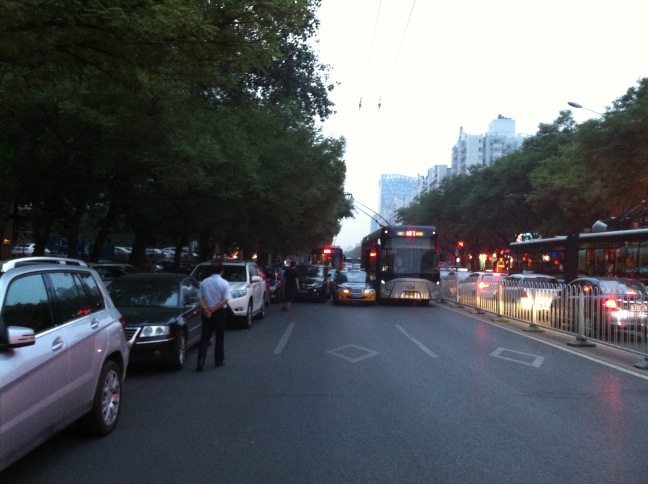
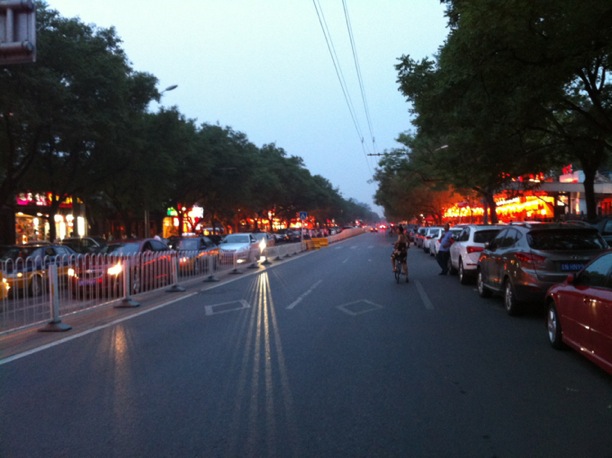






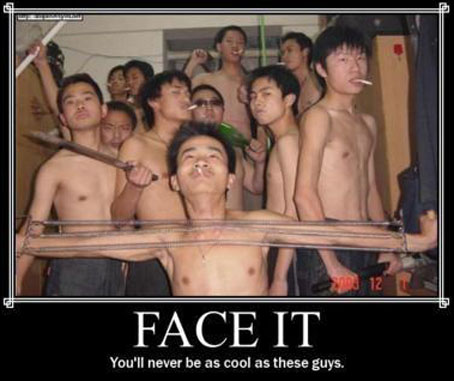
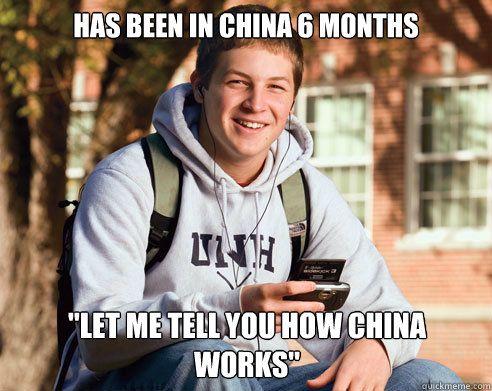

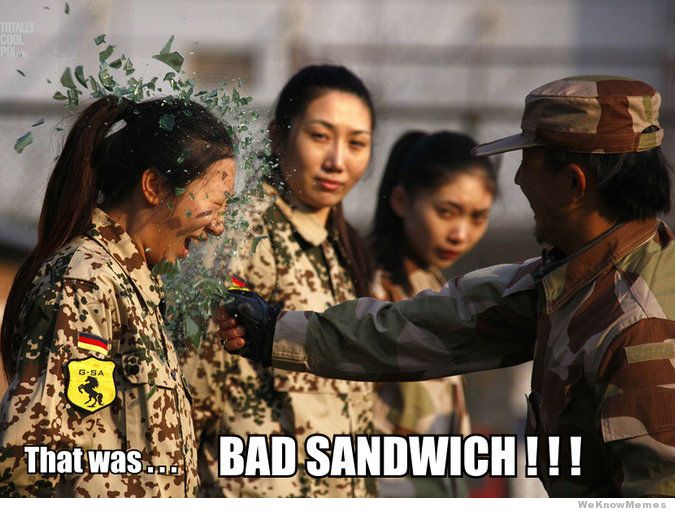








![Develop your students. Develop your career. Teach with EF English First. [Ad]](http://shanghaiist.com/attachments/shang_kenneth/EF-Logo_restrict_width_110.png) The following is an advertisement by EF English First. [
The following is an advertisement by EF English First. [
Comments